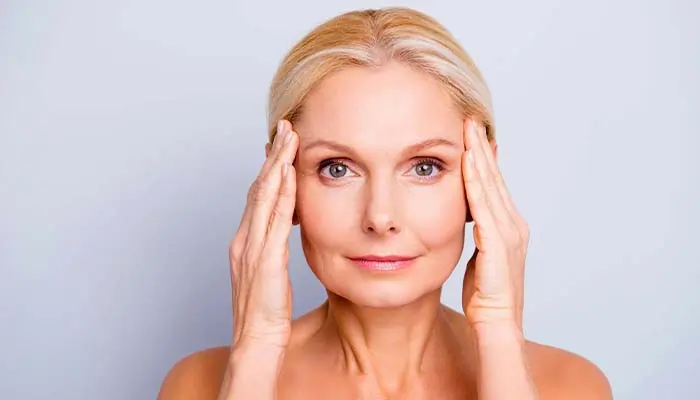Advertisement
Preventative Measures: How to Slow the Appearance of Wrinkles
While you can’t completely stop wrinkles from forming, there are several preventative measures you can take to slow their appearance. These strategies focus on protecting the skin, maintaining its health, and minimizing factors that contribute to premature aging.
Sun Protection Is Key
Protecting your skin from the sun is one of the most effective ways to prevent wrinkles. UV rays are the primary cause of premature aging, so it’s essential to incorporate sun protection into your daily routine.
- Use Sunscreen Daily: Apply a broad-spectrum sunscreen with an SPF of at least 30 every day, even on cloudy days or when you’re indoors near windows. Reapply every two hours if you’re outside, especially if you’re swimming or sweating.
- Wear Protective Clothing: Long-sleeved shirts, wide-brimmed hats, and sunglasses with UV protection can help shield your skin from the sun’s harmful rays.
- Seek Shade: Whenever possible, avoid direct sunlight, especially during peak hours between 10 a.m. and 4 p.m.
Stay Hydrated
Hydration is crucial for maintaining healthy skin. Drinking plenty of water helps keep your skin hydrated from the inside out, reducing the appearance of fine lines and wrinkles.
- Drink Water Regularly: Aim to drink at least eight 8-ounce glasses of water a day, more if you’re active or live in a hot climate.
- Use a Humidifier: If you live in a dry climate or spend a lot of time in air-conditioned environments, consider using a humidifier to add moisture to the air and prevent your skin from drying out.
Adopt a Skincare Routine
A consistent skincare routine can help maintain your skin’s health and slow the appearance of wrinkles. Your routine should focus on cleansing, moisturizing, and protecting your skin.
- Cleanse Gently: Use a gentle, hydrating cleanser to remove dirt, oil, and makeup without stripping your skin of its natural moisture.
- Moisturize Daily: Apply a moisturizer suited to your skin type every day. Look for products that contain ingredients like hyaluronic acid, glycerin, and ceramides, which help lock in moisture and plump the skin.
- Exfoliate Regularly: Exfoliating once or twice a week can help remove dead skin cells and promote cell turnover, leading to smoother, brighter skin. Choose a gentle exfoliant to avoid irritating your skin.
- Use Antioxidant Serums: Incorporate serums that contain antioxidants like Vitamin C or E into your routine. These can help protect your skin from free radicals and environmental damage.
- Apply Retinoids: Retinoids, derived from Vitamin A, are known for their ability to reduce the appearance of fine lines and wrinkles by promoting collagen production and speeding up cell turnover. Start with a low concentration and gradually increase as your skin builds tolerance.
Eat a Healthy, Balanced Diet
What you eat can significantly impact the health and appearance of your skin. A diet rich in vitamins, minerals, and antioxidants can help slow the aging process and keep your skin looking youthful.
- Include Antioxidant-Rich Foods: Antioxidants help neutralize free radicals that can damage skin cells. Berries, leafy greens, nuts, and seeds are excellent sources of antioxidants.
- Eat Healthy Fats: Omega-3 fatty acids, found in fish, walnuts, and flaxseeds, help maintain the skin’s lipid barrier, keeping it hydrated and supple.
- Get Enough Protein: Protein is essential for collagen production, which keeps the skin firm and elastic. Include lean meats, beans, and tofu in your diet.
- Limit Sugar and Processed Foods: High sugar intake can lead to glycation, a process that damages collagen and elastin, accelerating the formation of wrinkles.
Avoid Smoking and Excessive Alcohol Consumption
Both smoking and excessive alcohol consumption can contribute to the premature appearance of wrinkles.
- Quit Smoking: Smoking reduces blood flow to the skin, leading to a dull, sallow complexion and the formation of wrinkles, especially around the mouth. Quitting smoking can significantly improve the health and appearance of your skin.
- Limit Alcohol Intake: Alcohol dehydrates the skin, making wrinkles more noticeable. It can also lead to inflammation and damage to the skin’s surface over time. Limiting your alcohol consumption can help maintain your skin’s health.
Get Enough Sleep
Adequate sleep is essential for your overall health, including the health of your skin. During sleep, your body repairs and regenerates skin cells, making it a critical time for skin recovery.
- Aim for 7-9 Hours of Sleep: Most adults need between 7 and 9 hours of sleep per night for optimal health. Prioritize sleep to give your skin the time it needs to repair.
- Sleep on Your Back: Sleeping on your side or stomach can cause sleep lines, which may turn into permanent wrinkles over time. Try sleeping on your back to minimize this risk.
- Use a Silk Pillowcase: Silk pillowcases create less friction against your skin compared to cotton ones, reducing the likelihood of sleep lines.
Manage Stress
Chronic stress can take a toll on your skin, leading to premature aging and the formation of wrinkles.
- Practice Relaxation Techniques: Incorporate relaxation techniques like deep breathing, meditation, or yoga into your daily routine to manage stress.
- Maintain a Work-Life Balance: Prioritize activities that bring you joy and relaxation outside of work. A balanced lifestyle can help reduce stress and its impact on your skin.
- Exercise Regularly: Regular physical activity helps to reduce stress and improve circulation, which can lead to healthier, more radiant skin.










